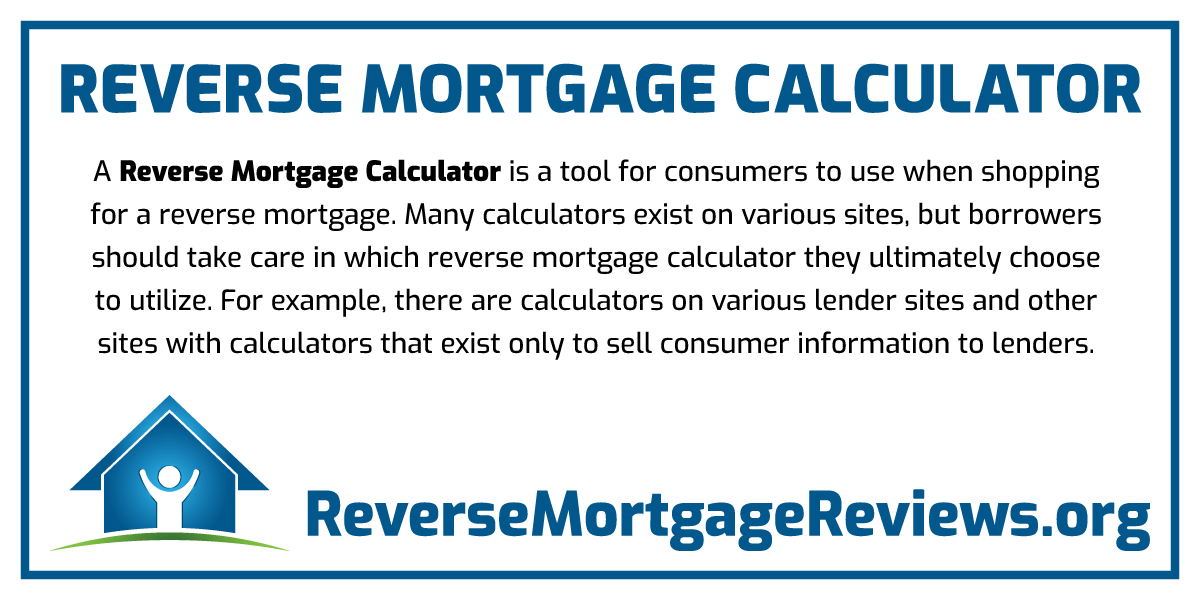Free Reverse Mortgage Calculator - No Personal Information
Mike Branson Jr. – Author
Mike Branson Jr. has 25 years of experience in the mortgage banking industry. He has devoted the past 19 years to reverse mortgages exclusively. Mike has worked in several aspects of the Mortgage industry, including Loan Origination, Underwriting, and Management.A Reverse Mortgage Calculator is a tool for consumers to use when shopping for a reverse mortgage.
Many calculators exist on various sites, but borrowers should take care in which reverse mortgage calculator they ultimately choose to utilize.
For example, there are calculators on various lender sites, and other sites with calculators that exist only to sell consumer information to lenders. These calculators require borrowers to complete a substantial amount of their personal information before the calculator will even give them the information the interested party is seeking (whether that is the borrower or someone looking for information on behalf of a prospective borrower).

Still other "calculators" are not really calculators at all.
They simply require interested parties to complete contact information and as much personal information as possible so solicitors can begin the process of trying to contact them.
If you get one of these data requests, these companies may not simply send you the information you request, but rather send you pieces of a proposal, or call you and constantly push you hoping to get you to commit before you have an opportunity to compare other lenders.
A true online calculator requires no personal information and is a valuable tool for the borrower that puts you in control.
For this reason, a calculator should be fast, accurate, easy to use and should give you the option of requesting a contact or not.
What a Reverse Mortgage Calculator Should Provide
Your calculations should provide the following information:
- Eligibility, available loan amounts and mortgage balance
- Available payment options such as line of credit, tenure or term payment plans
- Interest rates including adjustable & fixed rate options
- Sum of all closing costs including origination fees & 3rd party costs
It should give you the information you are requesting and not withhold the loan option information, requiring you to either fill in your personal information (such as social security numbers and all your contact information including phone number) just so that you can get an idea of what is available to you.
An effective calculator must allow you to see all options available and give you the opportunity to choose the option that best meets your needs. The calculator should be updated no less than daily and more often if needed.
It must have the ability to retrieve and populate the local third-party costs (appraisal, title insurance, recording fees, etc.) based on the zip code you provide so that your proposal has the most accurate fees and costs possible.
If the calculator or company you are using to compare programs does not give you all this information and functionality, you are not getting access to all the information available and are deciding at a distinct disadvantage!
Furthermore, you are not getting enough information to be able to compare and make an educated decision regarding the best option for you, especially if you want to compare several companies.
When researching a reverse mortgage, it's important to speak to your family and trusted financial advisor to weigh both the pros and cons.
Learn more about how a Home Equity Conversion Mortgage (HECM) loan might be right for you by contacting one of our top reverse mortgage lenders.
Calculator resources:
- ARLO Reverse Mortgage Calculator
ARLO offers the only calculator featuring eligibility, real-time interest rates/APR and closing costs. Side by side loan comparisons include HECM & Jumbo programs and their corresponding amortization schedules. - HUD HECM Calculator Software
HECM - Home Equity Conversion Mortgage calculator for Housing, lending & counseling professionals.
|
2 Comments on “Free Reverse Mortgage Calculator - No Personal Information”
|
-
Admin March 26, 2022 SunnyMarch 26, 2022 I understand that a reverse mortgage can also be used like a regular mortgage that you can skip payments on if you need to, but also you can make the payments and not have reverse amortization. I would love to see an article about this because it's something I'm considering. I think the down payment Hass to be 50% of the purchase price.



